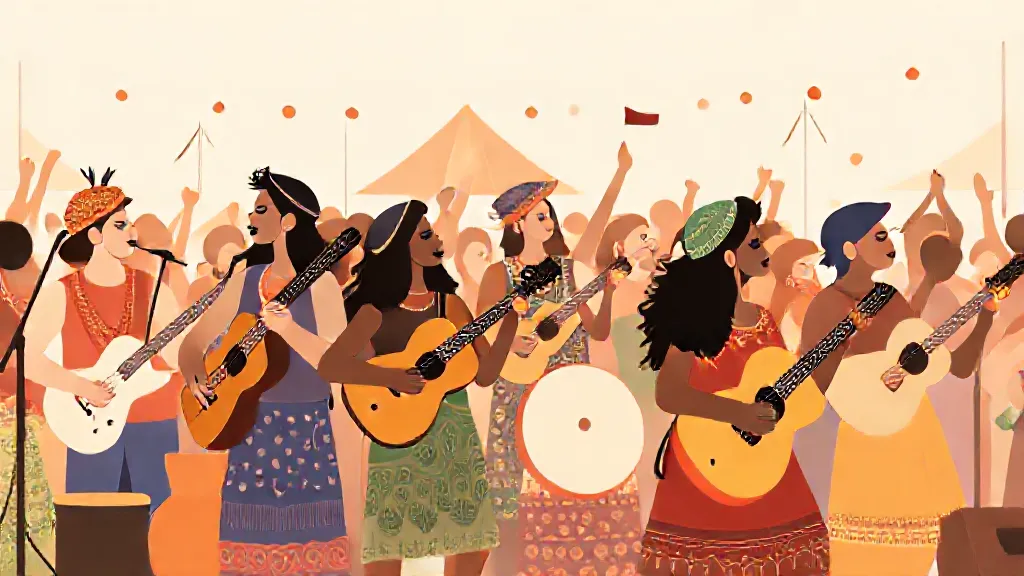Music has always been a fundamental component of human culture, acting as a reflection of societal values, beliefs, and identity. From traditional folk songs to contemporary pop music, the sounds we create and enjoy are deeply intertwined with our cultural backgrounds. This article delves into the multifaceted ways in which music shapes our cultural identity, examining historical contexts, regional influences, and the emotional connections that bind communities together.
Cultural Expression Through Music
Music serves as a powerful medium for cultural expression, allowing individuals and communities to articulate their experiences, struggles, and triumphs. For instance, the blues genre emerged from African American communities in the Deep South of the United States during the late 19th and early 20th centuries. This music style not only provided a form of entertainment but also served as a vehicle for expressing the pain of racial discrimination and economic hardship.
The lyrics often tell stories that resonate with shared experiences, reinforcing a sense of identity among listeners.
Historical Context and Evolution
Throughout history, music has evolved alongside cultural shifts, reflecting changes in societal norms and values. The Renaissance period, for example, saw a rebirth of interest in the arts, which was mirrored in the music of the time.
Composers like Josquin des Prez and Palestrina incorporated elements of humanism into their works, emphasizing emotional expression and the beauty of the human experience. This evolution in music not only marked a significant cultural shift but also influenced future generations of musicians and composers.
Regional Influences on Musical Identity
Geography plays a crucial role in shaping musical identity.
Different regions have distinct musical styles that reflect their cultural heritage. For instance, traditional Irish music, characterized by instruments like the fiddle and tin whistle, is deeply rooted in the island's history and folklore. Similarly, the rhythms and beats of African drumming are integral to the continent's diverse cultures, often linked to rituals and community gatherings.
By examining these regional influences, we can better understand how music acts as a cultural marker, distinguishing one community from another.
Music as a Tool for Social Change
Music has the power to inspire change and challenge societal norms. Throughout history, movements for social justice have utilized music as a rallying cry.
The civil rights movement in the United States, for example, featured songs like "We Shall Overcome," which became an anthem for equality and justice. These songs not only united people in a common cause but also highlighted the cultural identity of African Americans, reinforcing their struggle for civil rights and recognition.
The Role of Technology in Cultural Exchange
In today’s globalized world, technology has transformed the way we consume and create music, leading to an unprecedented exchange of cultural identities.
Streaming platforms and social media allow musicians from different backgrounds to share their work with a global audience, fostering collaboration and innovation. This cultural exchange can lead to the emergence of new genres that blend various musical traditions, such as reggaeton, which combines Latin rhythms with hip-hop influences. As a result, music becomes a melting pot of cultural identities, reflecting our interconnected world.
Emotional Connections and Community Building
Music has an innate ability to evoke emotions and create connections among individuals. Concerts and music festivals serve as communal experiences where people from diverse backgrounds come together to celebrate their shared love for music. These gatherings foster a sense of belonging and community, reinforcing cultural identities.
For instance, the annual Coachella Valley Music and Arts Festival attracts attendees from around the globe, creating a unique cultural tapestry that reflects the diverse influences of its participants.
Globalization and the Preservation of Cultural Identity
While globalization has facilitated the blending of musical styles, it also poses a threat to the preservation of traditional music and cultural identities. As mainstream music dominates the airwaves, local and indigenous music genres risk being overshadowed.
Efforts to preserve cultural heritage through music are essential to maintain the uniqueness of various cultural identities. Initiatives like UNESCO’s Intangible Cultural Heritage program aim to safeguard traditional music practices, ensuring that future generations can appreciate and engage with their cultural roots.
The Future of Music and Cultural Identity
As we look to the future, the relationship between music and cultural identity will continue to evolve.
The rise of artificial intelligence in music production and the increasing accessibility of music creation tools may lead to new forms of expression that challenge traditional notions of cultural identity. However, the core essence of music as a reflection of human experience will remain steadfast. By understanding and appreciating the diverse ways in which music shapes our cultural identity, we can foster greater empathy and connection in an increasingly divided world.
